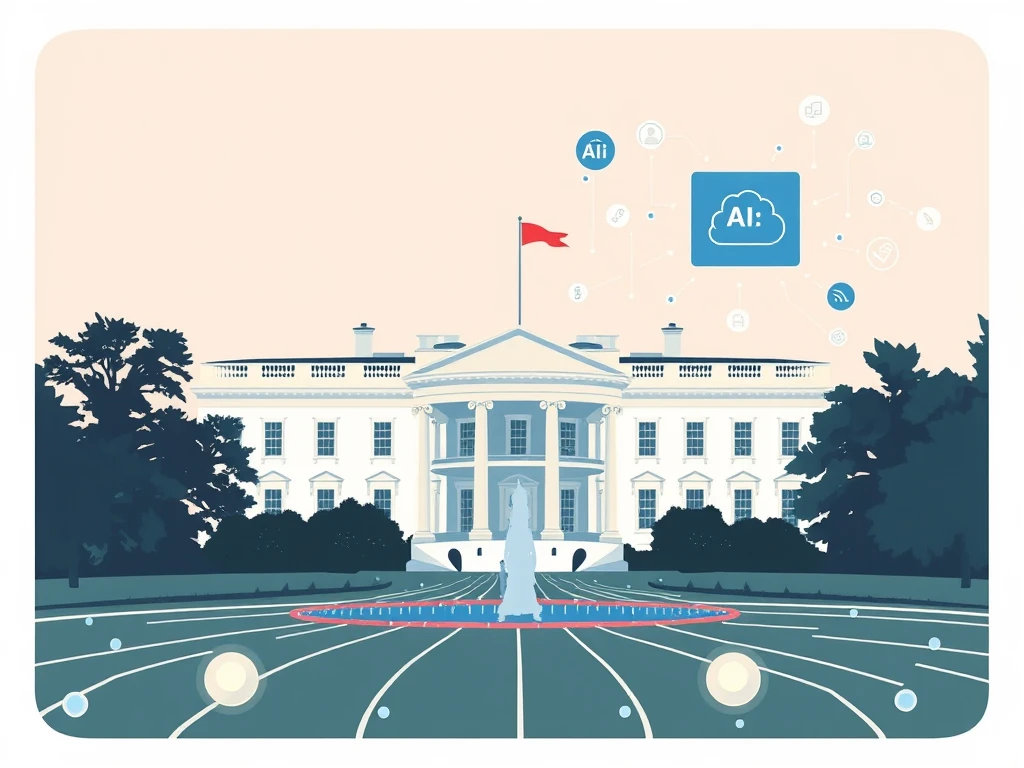Crucial White House AI Plan Draws Massive Public Response

In the rapidly evolving landscape of technology, artificial intelligence (AI) stands alongside cryptocurrency as a transformative force. A significant development impacting the future of AI, and potentially its intersection with digital assets, recently occurred in the United States. The White House announced on April 24 that its request for public comments on a planned national AI action plan garnered an overwhelming response, receiving over 10,000 submissions. This level of engagement highlights widespread interest in shaping the future of AI development and policy in the US, a nation aiming to lead the global AI race.
Understanding the White House AI Plan Initiative
The White House initiated this public feedback process by issuing a request for comments on February 6. The stated goal was to gather diverse perspectives to inform and define the priority policy actions needed to sustain and enhance America’s dominance in artificial intelligence. This proactive approach signals the administration’s recognition of AI’s strategic importance across economic, social, and national security domains.
The sheer volume of responses — exceeding 10,000 — demonstrates the high stakes involved and the broad range of stakeholders eager to contribute to the US AI policy framework. These submissions came from a variety of sources, including:
- Major AI companies (OpenAI, Meta, Amazon, Google, Microsoft)
- Academic institutions
- Non-profit organizations
- Industry associations
- Individual citizens
The feedback provides a rich dataset for policymakers to understand the concerns, priorities, and recommendations of those most directly involved in or impacted by AI development.
Key Themes Emerging from AI Development Feedback
A preliminary review of the feedback, particularly from major private-sector companies, revealed several recurring themes critical to advancing AI development in the United States. These points underscore the industry’s perspective on the foundational requirements for continued innovation and growth:
- **Investment in American Energy:** Many companies stressed the need for greater investment in US energy resources. AI training and deployment require significant computational power, which in turn demands substantial and reliable energy supply.
- **Foreign Policy and Global Influence:** Feedback highlighted the importance of foreign policy efforts aimed at enhancing the global influence of American AI firms. This includes navigating international standards, market access, and technological cooperation or competition.
- **Improved Domestic Infrastructure:** Recommendations frequently pointed to the need for better infrastructure within the US to support AI development. This encompasses computing resources, data availability, and connectivity.
Beyond these infrastructure and resource needs, a strong emphasis was placed on establishing an open, innovative framework for the American AI industry. Companies advocated for policies that encourage innovation while simultaneously providing necessary safeguards for individuals and society.
Addressing AI National Security Concerns
One of the most prominent themes in the comments was national security. Stakeholders across various sectors view AI development not just as an economic opportunity but as a critical component of national defense and geopolitical standing.
Venture capital firm Andreessen Horowitz explicitly stated that AI model development is a national concern requiring regulation at the federal level. They argued its criticality to American national security, geopolitical objectives, and overall welfare.
OpenAI also raised national security concerns, specifically mentioning China as a strategic competitor. They noted the advantages an authoritarian state might have in rapidly mobilizing resources for AI development, citing the launch of models like DeepSeek’s R1 in January 2025 as events that can trigger reactions in the US tech sector.
This focus on competition and security underscores the dual-use nature of AI technology and the perceived race for technological superiority between global powers.
The Intersection: AI Crypto Overlap
While the primary focus of the comments relates to AI policy, it’s important for the cryptocurrency community to note the increasing AI crypto overlap. Both are considered highly transformative emerging technologies. The development of AI-powered agents and their potential integration with digital financial products, decentralized systems, and blockchain technology is a growing area of interest and innovation.
Policies shaped by this White House AI plan could indirectly impact the development and deployment of AI applications within the crypto space. For instance, regulations around data usage, algorithmic transparency, or national security concerns related to AI could have implications for decentralized AI projects or AI-driven trading platforms.
As AI systems become more sophisticated, their interaction with digital assets, smart contracts, and decentralized finance (DeFi) protocols is likely to increase, creating new opportunities and challenges that will need to be considered in future regulatory discussions.
Conclusion: Shaping the Future of US AI Policy
The reception of over 10,000 comments on the White House AI plan signifies a crucial moment in shaping US AI policy. The extensive feedback from industry leaders, academia, and the public provides policymakers with a comprehensive view of the opportunities, challenges, and concerns surrounding AI development. Key themes like energy investment, infrastructure, global influence, and particularly national security will likely play a significant role in the final action plan.
For those interested in the broader technological landscape, including cryptocurrency, these developments are highly relevant. The trajectory of US AI policy will not only determine America’s position in the global AI race but also influence the environment in which the AI crypto overlap continues to evolve. Staying informed about these policy discussions is essential as AI increasingly integrates with digital finance and other sectors.







